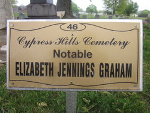Elizabeth Jennings Graham acted out against segregation in public transportation 40 years before Homer Plessy and 100 years before Rosa Parks. The year was 1854. The place was New York City. The state of New York had abolished slavery in 1827. Racial segregation was not confined to the South, however. 
Elizabeth Jennings, as she was then, was late for church. She was the organist at New York's First Colored American Congregational Church. She and a friend, Sarah Adams, got on a horse-drawn street coach. Other customers were inside. They were white, as was the driver. The conductor told Adams and Jennings to get off the coach; they refused, saying that they were late to church. The conductor relented but said that he would throw them off if any of the white passengers objected. No one complained, but the driver changed his mind and tried to forcibly remove Adams and Jennings from the coach. Jennings refused to leave, at first holding on to the window and then to the conductor himself. The coach had stopped, and a (white) police officer had joined the fray. The conductor and the officer shoved Jennings from the coach, leaving her bruised and her clothing soiled. The father of Elizabeth Jennings was Thomas Jennings, a well-to-do tailor and businessman who was the first African-American to be granted a patent, in 1821, for a method of dry cleaning clothes. He arranged a lawsuit against the coach operator, the Third Avenue Railroad Line. Representing the case in court was the law firm of Culbert, Parker and Arthur. The lawyer who argued the case was a 24-year-old lawyer named Chester A. Arthur. (He would go on to become President of the United States.) A judge named Rockwell from the Brooklyn Circuit Court found that the rights of Elizabeth Jennings had been violated. Specifically, the decision read, in part: "colored persons, if sober, well behaved and free from disease, had the same rights as others and could neither be excluded by any rules of the company, nor by force or violence." In that court, the procedure was for the judge to rule and then for the jury to award damages, if any. The jury awarded Jennings $225; the judge tacked on 10 percent and ordered the coach operator to pay Jennings's legal expenses. The coach operator ordered its coaches desegregated; it was now, however, the only coach operator in town. Just a month later, another African-American passenger, Peter Porter, was refused a ride on another New York City coach. He sued, and he won. Other lawsuits, and New York passed a law desegregating its public transportation in 1865. The Jennings family, meanwhile, continued to be active in the drive for an expansion of civil rights for African-Americans:
She married Charles Graham in 1860. The couple had a son, who died in his first year of life, during the 1863 New York Draft Riots. The Grahams moved to New Jersey for a time. Charles Graham died in 1867. 
Elizabeth Jennings Graham lived in New York City the rest of her life. In 1895, she opened the city's first kindergarten for African-American, in her home, at 247 West 41st Street. She died in 1901. A street in New York is named after her. |
|
Social Studies for Kids
copyright 2002–2026
David White


